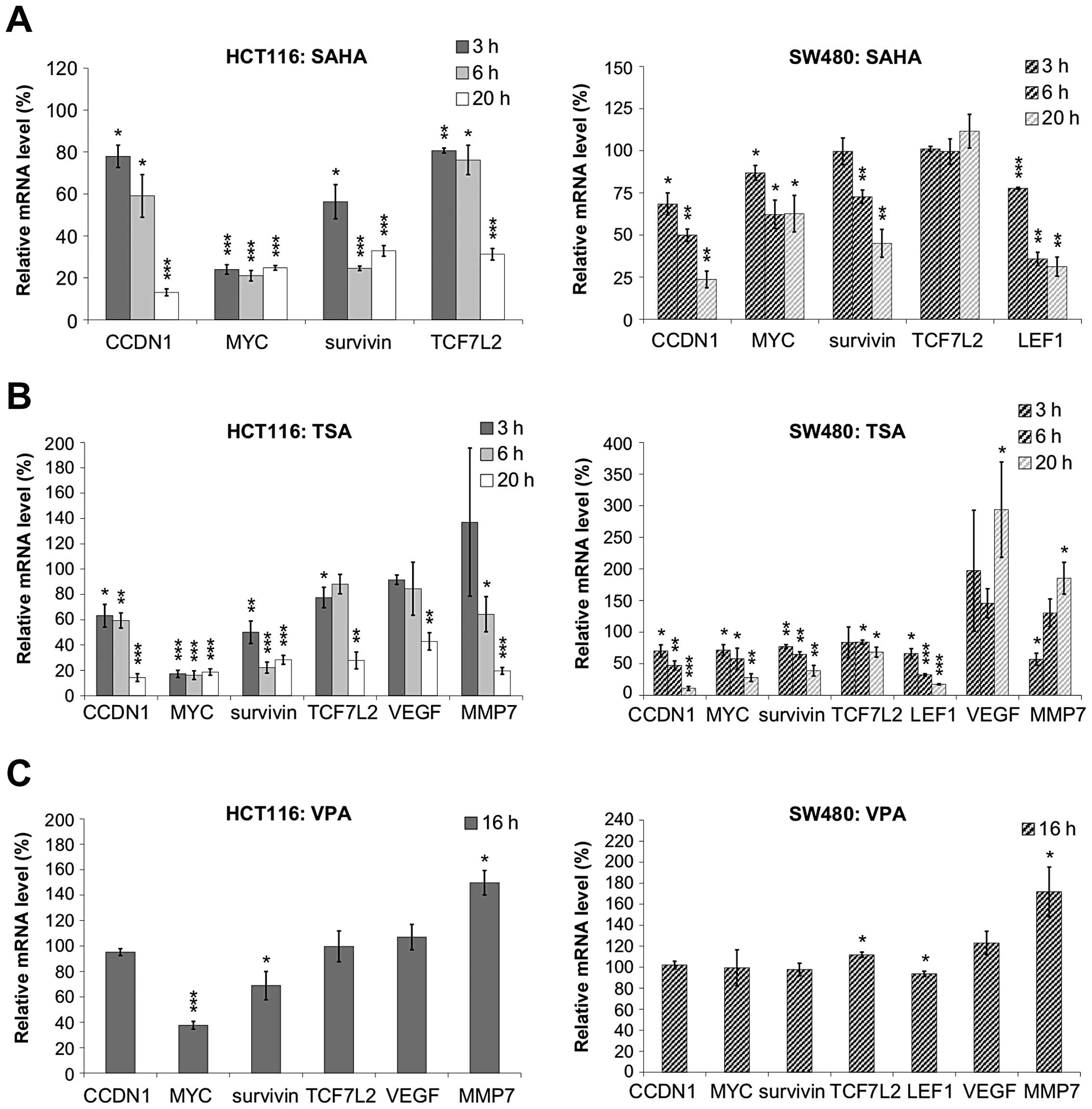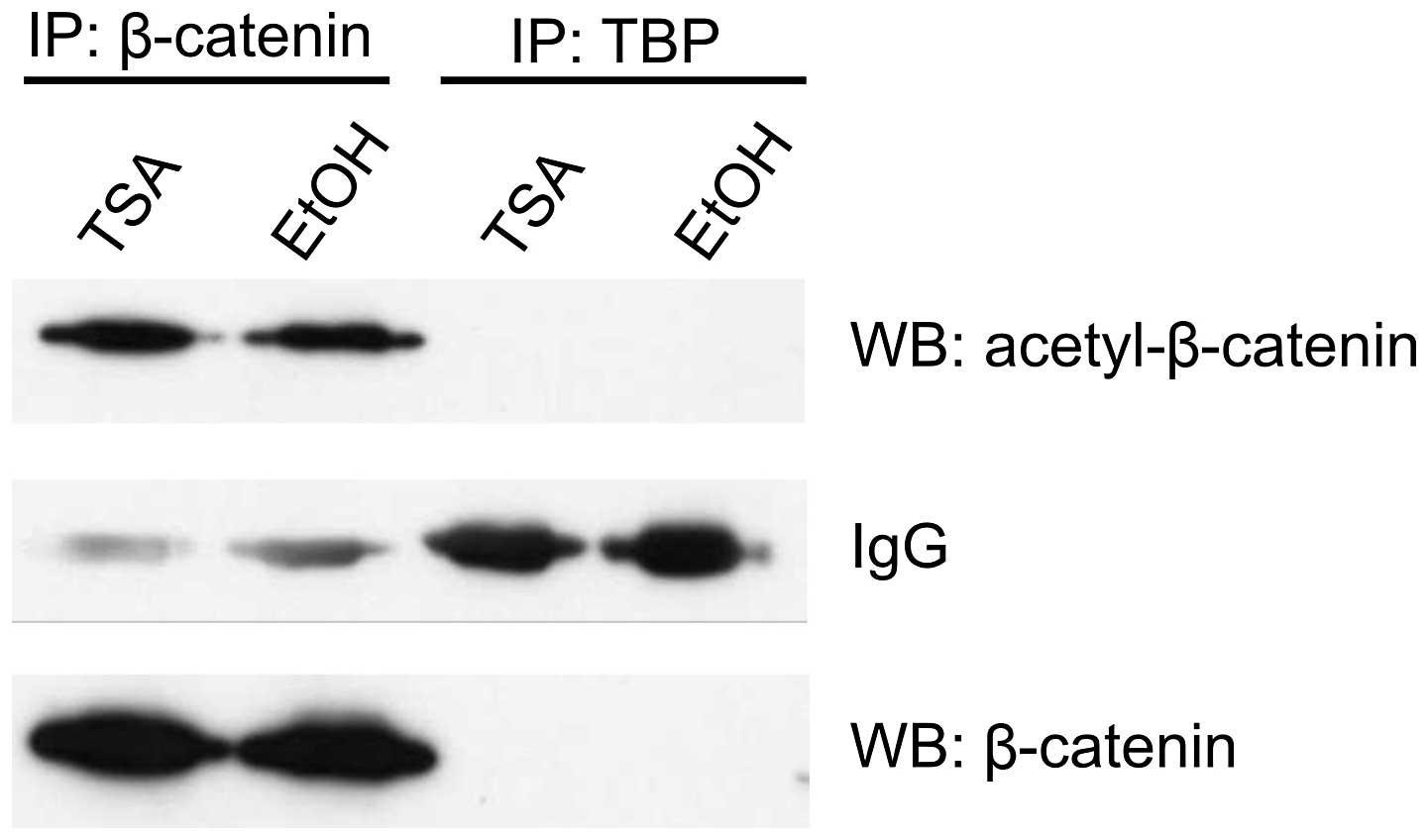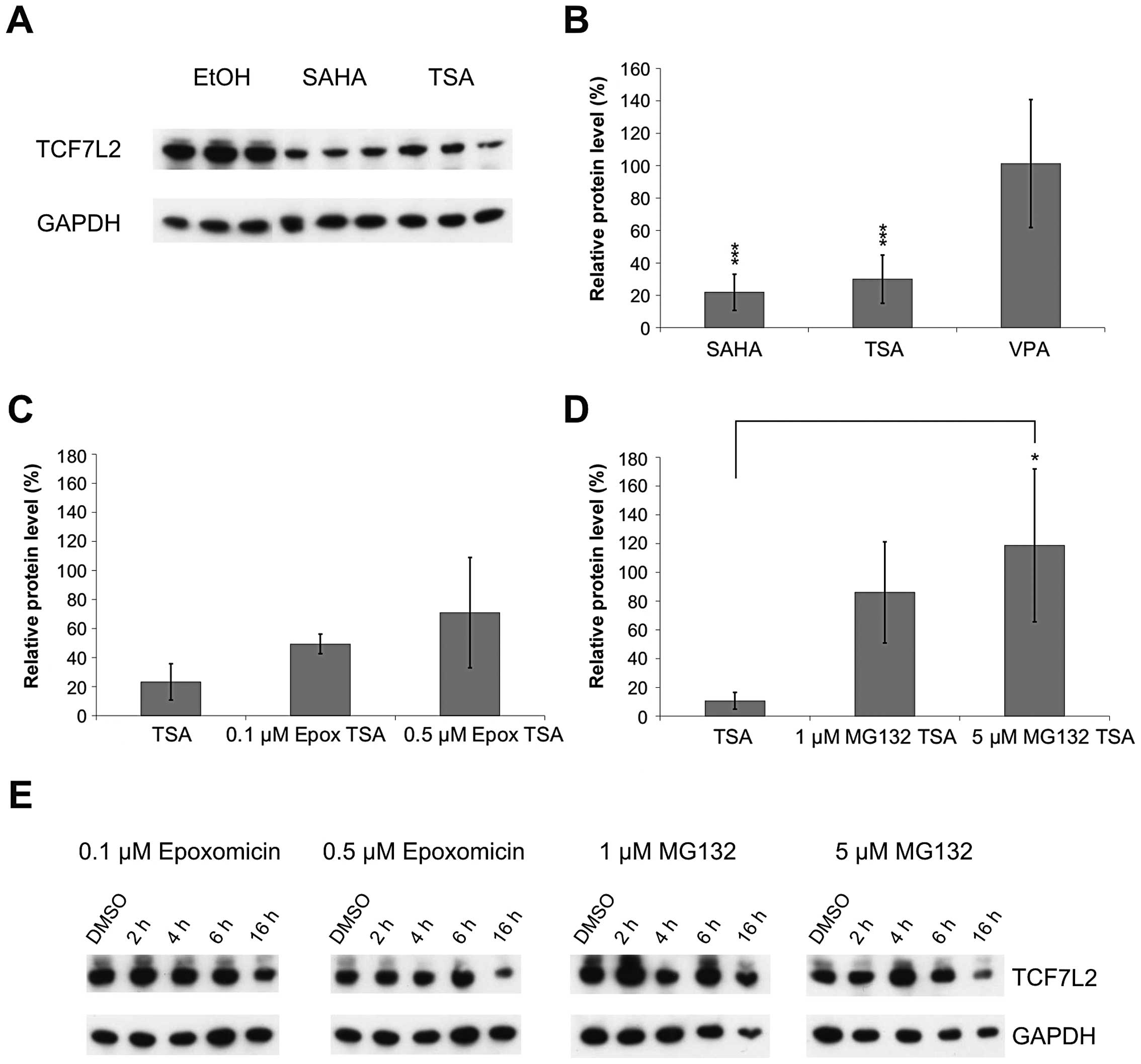|
1
|
Insinga A, Monestiroli S, Ronzoni S, et
al: Inhibitors of histone deacetylases induce tumor-selective
apoptosis through activation of the death receptor pathway. Nat
Med. 11:71–76. 2005. View
Article : Google Scholar : PubMed/NCBI
|
|
2
|
Schrump DS: Cytotoxicity mediated by
histone deacetylase inhibitors in cancer cells: mechanisms and
potential clinical implications. Clin Cancer Res. 15:3947–3957.
2009. View Article : Google Scholar
|
|
3
|
Rada-Iglesias A, Enroth S, Ameur A, et al:
Butyrate mediates decrease of histone acetylation centered on
transcription start sites and down-regulation of associated genes.
Genome Res. 17:708–719. 2007. View Article : Google Scholar : PubMed/NCBI
|
|
4
|
Hu J and Colburn NH: Histone deacetylase
inhibition down-regulates cyclin D1 transcription by inhibiting
nuclear factor-kappaB/p65 DNA binding. Mol Cancer Res. 3:100–109.
2005. View Article : Google Scholar : PubMed/NCBI
|
|
5
|
Luo J, Li M, Tang Y, Laszkowska M, Roeder
RG and Gu W: Acetylation of p53 augments its site-specific DNA
binding both in vitro and in vivo. Proc Natl Acad Sci USA.
101:2259–2264. 2004. View Article : Google Scholar : PubMed/NCBI
|
|
6
|
Jin YH, Jeon EJ, Li QL, et al:
Transforming growth factor-beta stimulates p300-dependent RUNX3
acetylation, which inhibits ubiquitination-mediated degradation. J
Biol Chem. 279:29409–29417. 2004. View Article : Google Scholar : PubMed/NCBI
|
|
7
|
Piekarz RL and Bates SE: Epigenetic
modifiers: basic understanding and clinical development. Clin
Cancer Res. 15:3918–3926. 2009. View Article : Google Scholar : PubMed/NCBI
|
|
8
|
Kim HJ and Bae SC: Histone deacetylase
inhibitors: molecular mechanisms of action and clinical trials as
anti-cancer drugs. Am J Transl Res. 3:166–179. 2011.PubMed/NCBI
|
|
9
|
Kobayashi H, Tan EM and Fleming SE:
Acetylation of histones associated with the p21WAF1/CIP1 gene by
butyrate is not sufficient for p21WAF1/CIP1 gene transcription in
human colorectal adenocarcinoma cells. Int J Cancer. 109:207–213.
2004. View Article : Google Scholar : PubMed/NCBI
|
|
10
|
Chen YX, Fang JY, Zhu HY, Lu R, Cheng ZH
and Qiu DK: Histone acetylation regulates p21WAF1 expression in
human colon cancer cell lines. World J Gastroenterol. 10:2643–2646.
2004.PubMed/NCBI
|
|
11
|
Zhu P, Martin E, Mengwasser J, Schlag P,
Janssen KP and Gottlicher M: Induction of HDAC2 expression upon
loss of APC in colorectal tumorigenesis. Cancer Cell. 5:455–463.
2004. View Article : Google Scholar : PubMed/NCBI
|
|
12
|
Reya T and Clevers H: Wnt signalling in
stem cells and cancer. Nature. 434:843–850. 2005. View Article : Google Scholar : PubMed/NCBI
|
|
13
|
Willert K and Jones KA: Wnt signaling: is
the party in the nucleus? Genes Dev. 20:1394–1404. 2006. View Article : Google Scholar : PubMed/NCBI
|
|
14
|
Morin PJ, Sparks AB, Korinek V, et al:
Activation of beta-catenin-Tcf signaling in colon cancer by
mutations in beta-catenin or APC. Science. 275:1787–1790. 1997.
View Article : Google Scholar : PubMed/NCBI
|
|
15
|
Lallemand F, Courilleau D, Sabbah M,
Redeuilh G and Mester J: Direct inhibition of the expression of
cyclin D1 gene by sodium butyrate. Biochem Biophys Res Commun.
229:163–169. 1996. View Article : Google Scholar : PubMed/NCBI
|
|
16
|
Kim MS, Kwon HJ, Lee YM, et al: Histone
deacetylases induce angiogenesis by negative regulation of tumor
suppressor genes. Nat Med. 7:437–443. 2001. View Article : Google Scholar : PubMed/NCBI
|
|
17
|
Bordonaro M, Lazarova DL, Augenlicht LH
and Sartorelli AC: Cell type- and promoter-dependent modulation of
the Wnt signaling pathway by sodium butyrate. Int J Cancer.
97:42–51. 2002. View
Article : Google Scholar : PubMed/NCBI
|
|
18
|
Heruth DP, Zirnstein GW, Bradley JF and
Rothberg PG: Sodium butyrate causes an increase in the block to
transcriptional elongation in the c-myc gene in SW837 rectal
carcinoma cells. J Biol Chem. 268:20466–20472. 1993.PubMed/NCBI
|
|
19
|
Varshavsky A, Bachmair A and Finley D: The
N-end rule of selective protein turnover: mechanistic aspects and
functional implications. Biochem Soc Trans. 15:815–816.
1987.PubMed/NCBI
|
|
20
|
Huang X and Guo B: Adenomatous polyposis
coli determines sensitivity to histone deacetylase
inhibitor-induced apoptosis in colon cancer cells. Cancer Res.
66:9245–9251. 2006. View Article : Google Scholar : PubMed/NCBI
|
|
21
|
Mologni L, Cleris L, Magistroni V, et al:
Valproic acid enhances bosutinib cytotoxicity in colon cancer
cells. Int J Cancer. 124:1990–1996. 2009. View Article : Google Scholar : PubMed/NCBI
|
|
22
|
Jin JS, Tsao TJ, Sun PC, Yu CT and Tzao C:
SAHA inhibits the growth of colon tumors by decreasing histone
deacetylase and the expression of cyclin D1 and survivin. Pathol
Oncol Res. 18:713–720. 2012. View Article : Google Scholar : PubMed/NCBI
|
|
23
|
Hsu YF, Sheu JR, Lin CH, et al:
Trichostatin A and sirtinol suppressed survivin expression through
AMPK and p38MAPK in HT29 colon cancer cells. Biochim Biophys Acta.
1820:104–115. 2012. View Article : Google Scholar : PubMed/NCBI
|
|
24
|
Young DA, Lakey RL, Pennington CJ, et al:
Histone deacetylase inhibitors modulate metalloproteinase gene
expression in chondrocytes and block cartilage resorption.
Arthritis Res Ther. 7:R503–R512. 2005. View
Article : Google Scholar : PubMed/NCBI
|
|
25
|
Wolf D, Rodova M, Miska EA, Calvet JP and
Kouzarides T: Acetylation of beta-catenin by CREB-binding protein
(CBP). J Biol Chem. 277:25562–25567. 2002. View Article : Google Scholar : PubMed/NCBI
|
|
26
|
Levy L, Wei Y, Labalette C, et al:
Acetylation of beta-catenin by p300 regulates beta-catenin-Tcf4
interaction. Mol Cell Biol. 24:3404–3414. 2004. View Article : Google Scholar : PubMed/NCBI
|
|
27
|
Nimmanapalli R, Fuino L, Bali P, et al:
Histone deacetylase inhibitor LAQ824 both lowers expression and
promotes proteasomal degradation of Bcr-Abl and induces apoptosis
of imatinib mesylate-sensitive or -refractory chronic myelogenous
leukemia-blast crisis cells. Cancer Res. 63:5126–5135. 2003.
|
|
28
|
Korinek V, Barker N, Morin PJ, et al:
Constitutive transcriptional activation by a beta-catenin-Tcf
complex in APC−/− colon carcinoma. Science.
275:1784–1787. 1997. View Article : Google Scholar : PubMed/NCBI
|
|
29
|
Bolden JE, Peart MJ and Johnstone RW:
Anticancer activities of histone deacetylase inhibitors. Nat Rev
Drug Discov. 5:769–784. 2006. View
Article : Google Scholar : PubMed/NCBI
|
|
30
|
Bali P, Pranpat M, Bradner J, Balasis M,
et al: Inhibition of histone deacetylase 6 acetylates and disrupts
the chaperone function of heat shock protein 90: a novel basis for
antileukemia activity of histone deacetylase inhibitors. J Biol
Chem. 280:26729–26734. 2005. View Article : Google Scholar : PubMed/NCBI
|
|
31
|
Park JH, Kim SH, Choi MC, et al: Class II
histone deacetylases play pivotal roles in heat shock protein
90-mediated proteasomal degradation of vascular endothelial growth
factor receptors. Biochem Biophys Res Commun. 368:318–322. 2008.
View Article : Google Scholar
|
|
32
|
New M, Olzscha H and La Thongue NB: HDAC
inhibitor-based therapies: Can we interpret the code? Mol Oncol.
6:637–656. 2012. View Article : Google Scholar : PubMed/NCBI
|
|
33
|
Kurashina R, Ohyashiki JH, Kobayashi C, et
al: Anti-proliferative activity of heat shock protein (Hsp) 90
inhibitors via beta-catenin/TCF7L2 pathway in adult T cell leukemia
cells. Cancer Lett. 284:62–70. 2009. View Article : Google Scholar : PubMed/NCBI
|
|
34
|
Jiang Y, Zhou XD, Liu YK, et al: Antisense
Tcf inhibits the neoplastic growth of liver cancer cells. J Cancer
Res Clin Oncol. 130:671–678. 2004. View Article : Google Scholar : PubMed/NCBI
|
|
35
|
Morin PJ, Vogelstein B and Kinzler KW:
Apoptosis and APC in colorectal tumorigenesis. Proc Natl Acad Sci
USA. 93:7950–7954. 1996. View Article : Google Scholar : PubMed/NCBI
|
|
36
|
He B, You L, Uematsu K, et al: A
monoclonal antibody against Wnt-1 induces apoptosis in human cancer
cells. Neoplasia. 6:7–14. 2004. View Article : Google Scholar : PubMed/NCBI
|
|
37
|
Minke KS, Staib P, Puetter A, et al: Small
molecule inhibitors of WNT signaling effectively induce apoptosis
in acute myeloid leukemia cells. Eur J Haematol. 82:165–175. 2009.
View Article : Google Scholar
|
|
38
|
Chen S, Guttridge DC, You Z, et al: Wnt-1
signaling inhibits apoptosis by activating beta-catenin/T cell
factor-mediated transcription. J Cell Biol. 152:87–96. 2001.
View Article : Google Scholar : PubMed/NCBI
|






















